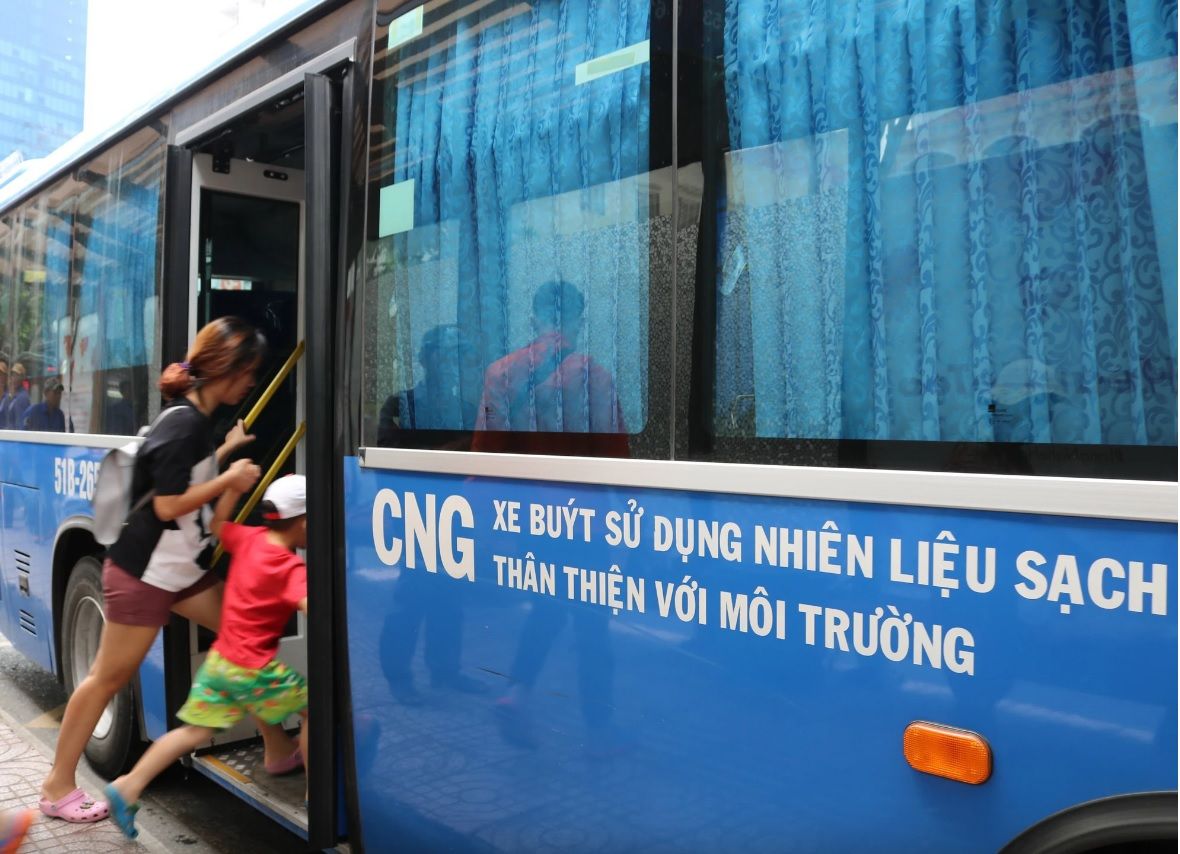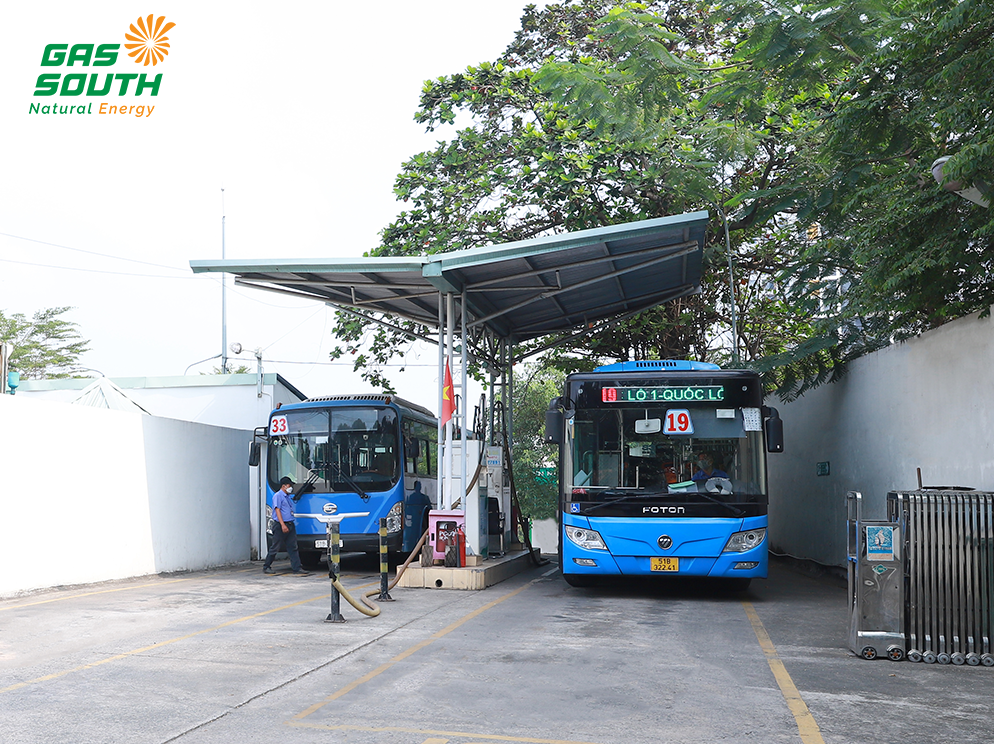Air pollution caused by smoke and emissions from vehicles is a problem in many countries worldwide, including Vietnam. To address this issue, CNG buses have been introduced for testing in major cities with the aim of reducing emissions. So what are CNG buses, and why do CNG buses have more prominent advantages compared to diesel buses? Let's explore the details in the following article with Gas South!
1. What is a CNG bus?
CNG buses are buses that use Compressed Natural Gas (CNG) as a substitute fuel for conventional diesel. CNG has good energy efficiency and emits fewer greenhouse gases, making it a clean fuel widely used in the transportation industry. Not only in buses, but CNG is also a potential fuel for replacing gasoline and diesel in many developed countries worldwide.

CNG buses use compressed natural gas as the main fuel
2. Comparing CNG buses and diesel buses
In general, CNG buses and diesel-powered buses are public vehicles with similar structures and roles. However, they differ in several key aspects
-
Fuel: Diesel buses use diesel fuel as the main fuel, while CNG buses use Compressed Natural Gas (CNG).
-
Operating cost: Under the same operating conditions, CNG buses can save about 30% in fuel costs compared to diesel buses. During combustion, CNG burns completely without leaving deposits, which increases the lifespan of the carburetor and significantly reduces engine maintenance costs.
-
Price: Diesel buses have an average price of around $80,000 per unit, while CNG buses have a price of around $100,000 per unit.
-
Environment: CNG is considered a clean and environmentally friendly fuel. On average, with the same fuel consumption, CNG buses emit less than 20% CO2, 30% NOx, and up to 70% less SOx compared to gasoline and diesel.

CNG buses have many outstanding advantages compared to diesel-powered buses
As a result, CNG buses offer several benefits over diesel-powered buses while having a relatively high cost. Therefore, when used properly, CNG buses may both serve to protect the environment and provide more economic efficiency than conventional buses.
Read more: Definition of Liquefied Natural Gas (LNG) and how it work?
3. The current circumstances of CNG bus development in Vietnam
Developing CNG buses and green vehicles has been a strategic objective pursued by Vietnam for many years. So, what is the current situation of CNG bus development in Vietnam? What opportunities and challenges exist in the development process? Let's find out right now!
3.1 Situation
Replacing conventional diesel buses with compressed natural gas (CNG) buses is a common goal nationwide to reduce greenhouse gas emissions and create green, safe, and civilized cities. The action program on green energy transformation and reduction of carbon and methane emissions in the transport industry was officially launched through Resolution 876/QD-TTG on July 22, 2022.
The target set for 2025 is that 100% of buses will use electricity and green energy. The public transportation levels of buses in Hanoi, excluding 5%, are 45%, followed by Da Nang at 25%, Ho Chi Minh City at 25%, Can Tho at 20%, Hai Phong at 15%, and other urban areas at a minimum of 5%. According to data released by the Hanoi Department of Transport, there are currently 269 buses running on electricity and compressed natural gas (CNG) in Hanoi, accounting for 13.3% of the total number of buses.
Since the CNG bus pilot program started in Ho Chi Minh City in August 2011, 21 CNG buses have been put into service. To meet the fuel demand of these vehicles, CNG filling stations were also established in 2010 and 2011. Currently, more and more organizations are boldly investing to replace damaged and deteriorated buses with CNG buses to build a beautiful, clean, and green public transportation system.
3.2 Chances
As mentioned above, CNG fuel has numerous outstanding advantages over traditional diesel fuel. According to experts, CNG not only helps save energy and reduce operating costs but also has very high safety standards. With low emissions, CNG presents a golden opportunity for a significant transformation in the public transportation sector in major cities.
The CNG bus conversion and pilot program also receive strong government support. Several important initiatives in the direction of CNG development are gradually being implemented throughout the country. Bus companies have also realized the superior efficiency of CNG buses and have undergone significant transformations in recent years.
With abundant supply and outstanding economic efficiency, CNG will gradually replace gasoline and diesel as the ideal fuel in the coming years. The global trend of transitioning to CNG will enable businesses in Vietnam to easily access more affordable CNG-powered transportation. As the infrastructure and methods for using CNG are continuously improved, the cost of CNG usage for businesses will become more stable in the future.
3.3 Challenges
The initial investment expense is the largest obstacle to the switch to CNG buses. Since the cost of CNG buses is still fairly high, many companies and transportation cooperatives are unable to make synchronized replacement investments. The government's preferred and subsidized policies for CNG use are also not very attractive to many enterprises, therefore the process of replacing CNG buses in many communities is still going very slowly.

CNG filling station provided by Gas South
During operation, CNG-fueled buses also face certain drawbacks, with the most prominent being the fueling process. Currently, the number of CNG filling stations nationwide is relatively limited, making the fueling process inconvenient. Additionally, the fluctuating global situation has led to price instability for CNG, causing concerns for many businesses regarding the potential increase in CNG prices and the difficulty of controlling input costs.
CNG-fueled buses are a public transportation solution that many countries around the world are implementing, bringing numerous benefits to the economy and contributing to greenhouse gas reduction. In this article, Gas South has helped you understand "what is a CNG-fueled bus?" and grasp some prominent advantages of CNG-fueled buses. If you and your partners need more information about compressed natural gas (CNG), please contact Gas South directly through the following channels:
-
Headquarters: 4th Floor, PetroVietnam Tower, 1-5 Le Duan Street, Ben Nghe Ward, District 1, Ho Chi Minh City
-
Phone: (+84.28) 3910.0108
-
Email: lienhe@pgs.com.vn
-
OA Zalo: https://zalo.me/gassouth18006776



